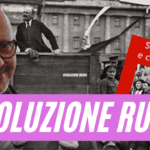


STALIN – II guerra mondiale
30 Dicembre 2012

MARTIN LUTHER KING
30 Dicembre 2012FRANKLIN DELANO ROOSEVELT
(Hyde Park 1882 – Warm Springs 1945)
Rappresentante del partito democratico, eletto presidente nel 1932, durante la gravissima crisi economica iniziata nel 1929 elaborò un vasto piano di intervento in ogni settore economico e sociale noto come New Deal. Riconfermato nella carica nel 1937, chiese al Congresso di approvare altri importanti provvedimenti, tra cui il Social Security Act (1935), col quale si istituì la previdenza sociale, e il Wagner Act, che concedeva ai lavoratori nuovi diritti di contrattazione.
In politica estera fu favorevole a una politica isolazionista, sottolineata dall’approvazione del Neutrality Act (1935), per la quale fu gradualmente limitata l’interferenza negli affari interni degli stati latinoamericani e favorita la solidarietà interamericana.
Durante il terzo mandato presidenziale (1940-1945), mentre in Europa infuriava la guerra, si rese conto, con una svolta di politica estera che ne confermò la lungimiranza per la quale è considerato uno dei più grandi presidenti della storia, che il conflitto era decisivo per le sorti stesse dell’umanità e anche dello sviluppo del suo paese. Presentò allora la legge sugli affitti e prestiti (Lend-Lease Act, 1940), che avviò il sostegno decisivo alla Gran Bretagna, poi esteso all’Urss.
Nel dicembre 1941 fu costretto dall’attacco giapponese a Pearl Harbor a decidere l’entrata in guerra, segnata dal “Joint address to Congress leading to a declaration of war against Japan” ( 8 dicembre 1941) .
Nella Carta atlantica (1941)concordata con Churchill trasfuse gli obiettivi statunitensi per il dopoguerra. La strategia statunitense della riorganizzazione delle relazioni internazionali fu definita nella conferenza di Jalta (1945), ma in seguito egli fu accusato di essere stato troppo accondiscendente nei confronti di Stalin. Morì poco dopo la quarta rielezione.
Pearl Harbour – Address to the Nation (December 8th, 1941)
Mr. Vice President, Mr. Speaker, Members of the Senate, and of the House of Representatives:
Yesterday, December 7th, 1941 — a date which will live in infamy — the United States of America was suddenly and deliberately attacked by naval and air forces of the Empire of Japan.
Yesterday, December 7th, 1941 — a date which will live in infamy — the United States of America was suddenly and deliberately attacked by naval and air forces of the Empire of Japan.
“A date which will live in infamy” : Roosvelt underlines how the Japanese attack was an unprovoked act of cowardice.
The United States was at peace with that nation and, at the solicitation of Japan, was still in conversation with its government and its emperor looking toward the maintenance of peace in the Pacific.
Like in other speeches of national leaders in wartime, although they tried to avoid war, they were forced to join the conflict first
Indeed, one hour after Japanese air squadrons had commenced bombing in the American island of Oahu, the Japanese ambassador to the United States and his colleagues delivered to our Secretary of State a formal reply to a recent American message. And while this reply stated that it seemed useless to continue the existing diplomatic negotiations, it contained no threat or hint of war or of armed attack.
It will be recorded that the distance of Hawaii from Japan makes it obvious that the attack was deliberately planned many days or even weeks ago. During the intervening time, the Japanese government has deliberately sought to deceive the United States by false statements and expressions of hope for continued peace.
The attack was such an act of cowardice because diplomatic negotiations were still taking place. They were interrupted only an hour after the first strike of Pearl Harbour whereas the attack had been planned even weeks before, while the Japanese falsely expressed hopes of peace in the Pacific.
The attack yesterday on the Hawaiian island has caused severe damage to American naval and military forces. I regret to tell you that very many American lives have been lost. In addition, American ships have been reported torpedoed on the high seas between San Francisco and Honolulu.
Yesterday, the Japanese government also launched an attack against Malaya.
Last night, Japanese forces attacked Hong Kong.
Last night, Japanese forces attacked Guam.
Last night, Japanese forces attacked the Philippine Islands.
Last night, the Japanese attacked Wake Island.
And this morning, the Japanese attacked Midway Island.
Japan has, therefore, undertaken a surprise offensive extending throughout the Pacific area. The facts of yesterday and today speak for themselves. The people of the United States have already formed their opinions and well understand the implications to the very life and safety of our nation.
Roosvelt enlists all the initiatives carried on by Japan against the USA and all the other Nations in the Pacific area right after the surprise attack, aimed underlining the enormous danger Japan now represents: he doesn’t even need to demonstrate this, “The facts of yesterday and today speak for themselves” .
As commander in chief of the Army and Navy, I have directed that all measures be taken for our defense. But always will our whole nation remember the character of the onslaught against us.
No matter how long it may take us to overcome this premeditated invasion, the American people in their righteous might will win through to absolute victory.
No matter how long it may take us to overcome this premeditated invasion, the American people in their righteous might will win through to absolute victory.
After having spoken about the dangers and difficulties the USA were going to get through, he wants to reassure the nation, saying that all measures for the defence have been taken and that the American People will win this war, because their might is “right” , whereas that of the opponent is “wrong” .
I believe that I interpret the will of the Congress and of the people when I assert that we will not only defend ourselves to the uttermost, but will make it very certain that this form of treachery shall never again endanger us.
Hostilities exist. There is no blinking at the fact that our people, our territory, and our interests are in grave danger.
The President believes to interpret the will of the Congress and of the people: there can’t be any division about what to do now. Everybody in the Nation is sure of one thing: the United States of America will fight until the end and won’t let another Pearl Harbour happen again. The Nation has to be unite because: “our people, our territory, and our interests are in grave danger.”
With confidence in our armed forces, with the unbounding determination of our people, we will gain the inevitable triumph — so help us God.
Roosvelt is sure the American people is on the right side and asks God to help them. He has confidence in the American armed forces: victory is inevitable.
I ask that the Congress declare that since the unprovoked and dastardly attack by Japan on Sunday, December 7th, 1941, a state of war has existed between the United States and the Japanese empire.


